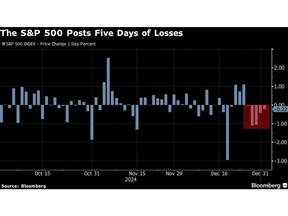Article content
(Bloomberg) — Asian equities were primed to open lower Friday after US stocks fell for a fifth day, underscoring a cautious start to the year on Wall Street.
Asian equities were primed to open lower Friday after US stocks fell for a fifth day, underscoring a cautious start to the year on Wall Street.

(Bloomberg) — Asian equities were primed to open lower Friday after US stocks fell for a fifth day, underscoring a cautious start to the year on Wall Street.
Article content
Article content
Futures contracts for shares in Australia and Hong Kong slipped, taking a cue from New York trading. Nikkei futures also declined, though Japan’s equity trading is closed for a holiday.
The S&P 500 and Nasdaq 100 both fell 0.2%, partly weighed down by lackluster results from Tesla Inc. The electronic vehicle-marker’s fourth-quarter deliveries missed estimates and annual sales dropped for the first time in over a decade. The carmaker’s stock has registered its worst five-day drop in more than two years and has now fallen 18% since Christmas.
Advertisement 2
Story continues below
Article content
The dollar strengthened for a seventh session to set a fresh two-year high, while the yen weakened against the greenback for a third day Thursday.
Australian and New Zealand government bond yields were steady, reflecting muted moves in Treasury yields in choppy trading.
The rate on the benchmark 10-year ended Thursday nearly 20 basis points above the level prior to Jerome Powell’s hawkish turn at a Dec. 18 Federal Reserve meeting. Big moves have proliferated across asset classes after Powell’s board expressed waning enthusiasm for interest-rate cuts.
Initial applications for US unemployment fell to an eight-month low, reflecting relatively muted levels of job cuts in a labor market that has remained surprisingly resilient. Goldman Sachs Group Inc. economists led by Jan Hatzius noted that “seasonal adjustment challenges can make jobless claims readings particularly volatile around the holiday season.”
The Cboe Volatility Index climbed for the fourth time in five days, though still sits below 18.
For corporate earnings, 2025 will be a “show-me year,” according to Lisa Shalett at Morgan Stanley Wealth Management, who warned that the dominance of the Magnificent Seven — the big technology stocks responsible for the bulk of last year’s gains — was teetering.
Article content
Advertisement 3
Story continues below
Article content
“This idea that they as a group can trade together and lead the market may falter in 2025,” she said. As for the grim slide in the final days of 2024, it’s “too soon to call it a bad omen,” Shalett said on Bloomberg Television.
US stocks have been straining to snap a losing streak that took some shine off the S&P 500’s best two-year run dating back to the late 1990s. The index has surged more than 50% since the start of 2023, driven by gains in the tech megacaps amid enthusiasm about the boost to profits from artificial intelligence.
In Asia, data set for release includes November retail sales for Singapore and gross international reserves figures for Thailand.
Investors will be watching the House speaker vote Friday to see if Mike Johnson will retain his position. Republican squabbling over his reelection could bode ill for President-elect Donald Trump’s agenda, according to Tom Essaye, founder of the Sevens report.
If Johnson’s confirmation takes several rounds of voting over several days, “that will be a bad sign for Republican unity and hopes for quick action on pro-growth policies will take a hit,” he wrote.
Advertisement 4
Story continues below
Article content
In the months to come, the growth outlook in Europe and China, the Fed’s policy path and Trump’s ability to execute on his campaign promises will be among the most pressing items on traders’ radars.
European energy shares outperformed after a sharp increase in natural gas prices as the region braced for freezing winter temperatures without Russian supplies delivered via Ukraine. A transit contract between the two warring nations expired on New Year’s Day, with no alternative in place.
The euro fell to the weakest against the dollar in over two years reflecting concerns about European growth, US trade tariffs and monetary policy divergence with the US. Many strategists are forecasting a slide to parity with the dollar or even lower this year.
In Asia, sentiment was subdued, with Chinese equities the worst performers as data pointed to a slowing economy and traders looked ahead to potentially higher tariffs. MSCI Inc.’s gauge of Asian shares fell for the third day out of the past four. Financial markets in Japan remained closed.
Elsewhere in commodities, oil climbed after an industry report signaled US crude stockpiles continued to shrink. A report from the American Petroleum Institute showed inventories fell by 1.4 million barrels last week, which would be a sixth straight drop.
Advertisement 5
Story continues below
Article content
Gold rose Thursday and traded at around $2,657 an ounce. Bitcoin was steady after extending a rally Thursday.
Key events this week:
Some of the main moves in markets:
Stocks
Currencies
Cryptocurrencies
Bonds
Commodities
This story was produced with the assistance of Bloomberg Automation.
Article content
Comments